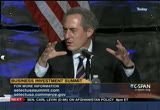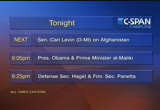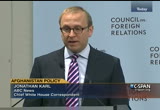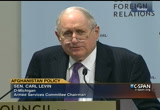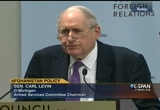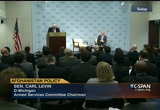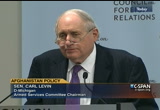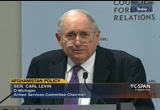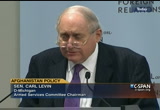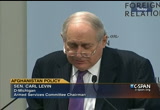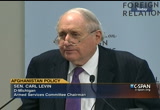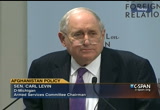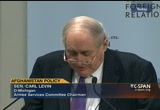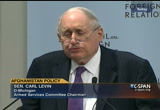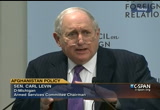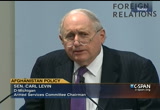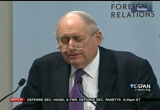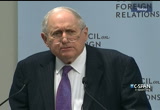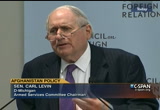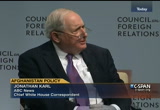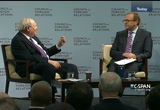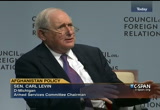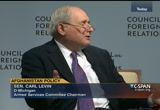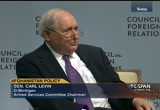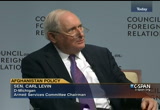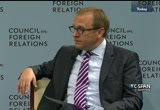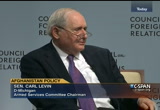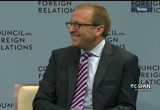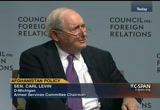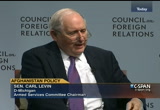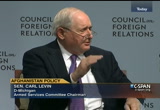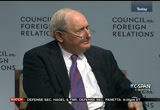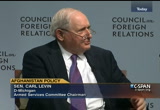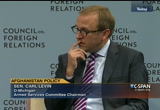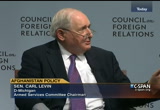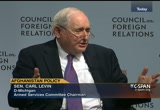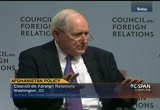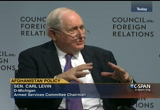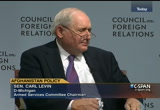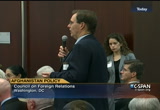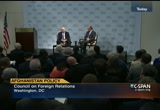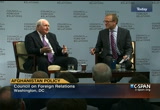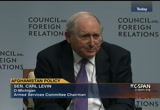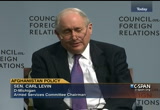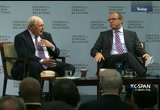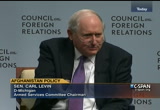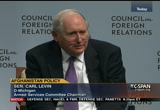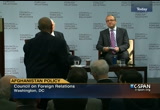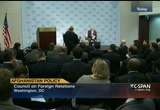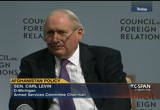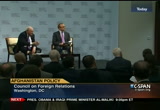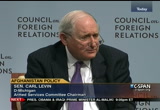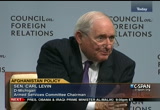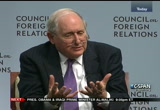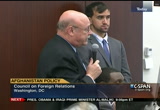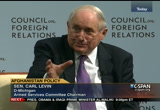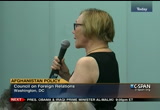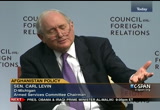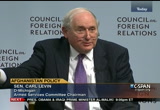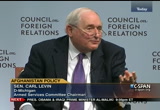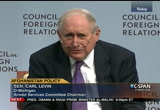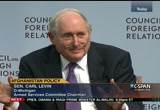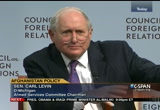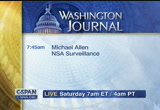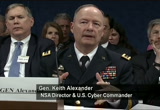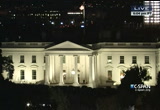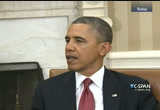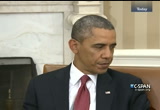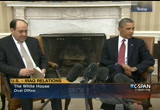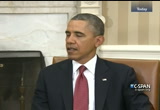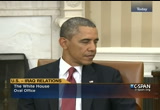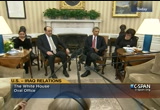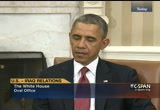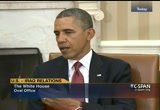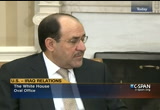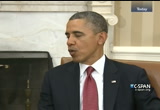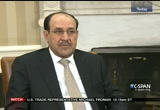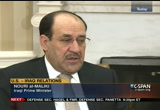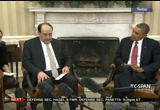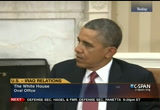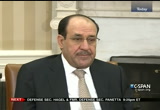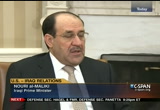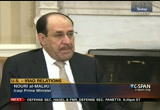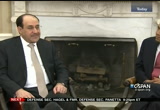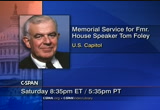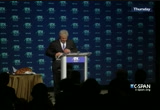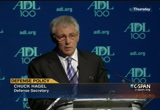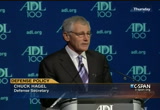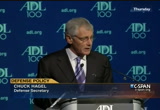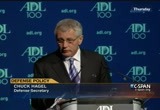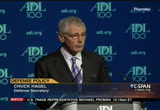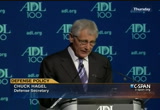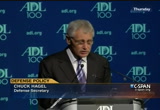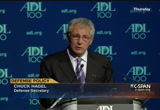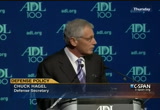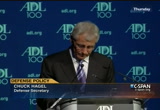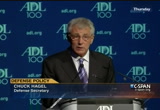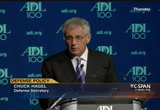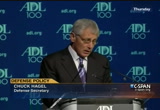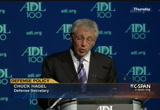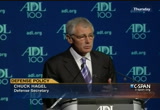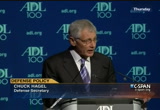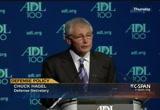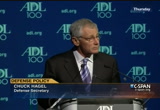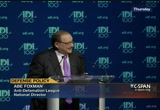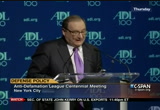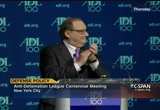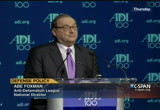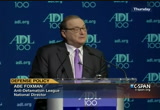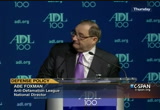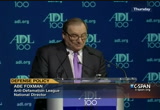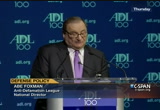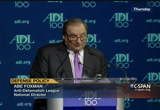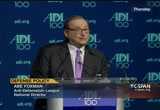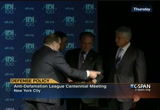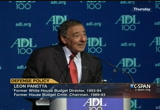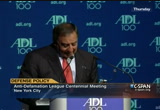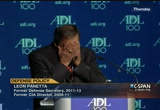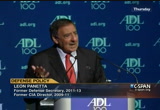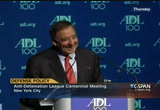tv Key Capitol Hill Hearings CSPAN November 1, 2013 8:00pm-10:01pm EDT
8:00 pm
tip, to make sure we are at the center of this network of agreements, together with our legal system, our education system, our access to energy, could make this a platform that every country around the world wants to be in. and growth here at home. >> we will close down. thank you so much for all of thoughts. well done. [ applause ] >> tonight, on c-span. armed services committee chairman senator carl levin inlks about the situation afghanistan. followed by remarks from obama and prime minister of iraq nouri themaliki and remarks at antidefamanion league. week, michigan senator carl levin traveled to
8:01 pm
and met with president karzai. today, the senate armed services committee chairman about improvements in the country as the u.s. and prepare to remove troops from afghanistan in 2014. from the council on foreign relations. is an hour. >> welcome to the foreign relations. i'm johnathan karl. a high honor to be here with levin. introduction.s no interduck carl levin is the chairman of the senate armed services from the great state of michigan and of special interest to me, just back from a trip to afghanistan where he commanders over there and also had a one on one president karzai. i'm eager to hear about that and senator levin has some tomarks about the trip afghanistan and then we will have a conversation. levin?r >> well, thank you, jon.
8:02 pm
we appreciate the invitation to join you this morning and look forward to that conversation as well. just here to share my ideas but hopefully to receive ideas that we all need in this kind of a world that we live in. mentioned, i recently returned from afghanistan where couple days meeting with our commanders, with our troops, with president karzai. we also met with the foreign minister there and the defense minister in brussels before we afghanistan. feel that things have significantly improved and changed for the better during the last ten-year period. have been there perhaps 12 times or so. my staff who is with me today will tell me later on it was only 11 or it was really 13.
8:03 pm
have been there a lot. and the changes are pretty striking, particularly in the last few years. that is not the impression which the american people have and i will get into that in a moment. but that to me is the obvious fact that things have changed better.nged for the number of ways in afghanistan. first of all, it is more secure. is more secure because we came. it is that simple. we and our allies have made a difference. army,rowth of the afghan the strength of the afghan army on the police now, which has grown into a much more capable and respected force, including local police, which has made a major difference villages ofy in the afghanistan because they are
8:04 pm
directly connected to the elders in those villages. feared forcemost policeose 25,000 local feared by the taliban and because they are so directly homes.ted to their they are protecting their homes have become and are a major threat to taliban control and success. insurgency or the taliban is a resilient force. it shouldn't be underestimated. a long way to go in afghanistan in terms of it becoming truly a is freer ofch terror, but nonetheless, the pretty striking. there have been changes in the economy. in afghanistan. we drove across kabul to the university in afghanistan. i wish every american could go
8:05 pm
american university in afghanistan. there, if every american could go there, or if american could see what is happening just in that one across kabul to it, i believe it would change most americans about what we have accomplished theh our allies and with afghan security forces in afghanistan. the city now is full of cars, isere is traffic jams, there shops opening all over the place. people are in markets. drive -- we couldn't across kabul, they wouldn't let across kabul years before. it just simply was too dangerous. it is still a dangerous place, by the way. i don't want to sound
8:06 pm
pollyannish here. things havent is changed for the better in afghanistan and the american people, sadly, don't know it. relative to the american by way ofy itself part of the story, of course, is the growth in the number of students. when it opened i think it with 53 students. there is now 1,000 students there. 300 of them are women. and they have a broad number of courses. i won't go into all those. on ann a a newd campus an international campus women's economic development. that was established with department of defense dollars. make thatove to off-the-record, but i can't i'm sure some of my colleagues will say what are we defensehe department of
8:07 pm
dollars to open up a women's economic development school, a.i.d.?'t that why is it d.o.d.? significantly to the security of the country, but i think basically the answer is because the d.o.d. did a number of things including some of the commanders' expenditures which helped the development of that is so essential to its security and this is part of it. at thee story we got american university at a town meeting we had there is one hisdent we talked about life experience. when the taliban was there, he took refuge with his family. a younger boy at that time. for safety.o iran taliban wereheas th
8:08 pm
driven out, he came back and was accepted at the american university. taught himself as a matter of fact, how to read and how to right. he is now interviewing for a job as a sales manager at seimens and applying for a scholarship. there are four fullbright scholars at the american university in kabul. wanted me to say thanks to the american people. so this is as close as i will be able to come. ine education system afghanistan, not just higher education. universities, the number that was given to me is so i don'ttuitive use it. in terms of the lower grades before you get to colleges and universities, before the taliban was driven out to the been, 900,000ave boys in afghan schools ten or so.ago now 8 million students in schools.
8:09 pm
about 3 million of those are girls. none of whom could have been educated before we got there allies.r in 2001, under the taliban were 20,000 teachers, all male. now 200,000 teachers. 60,000 of whom are women. healthcare many improved. significantlyty down. refugeeslion afghan who fled to pakistan have returned home. that 67% of the a mostan people in recent survey think that the afghan war was not worth fighting? how did that happen?
8:10 pm
the picture is much, number.tter than that i just don't believe that the american people have had a fair or fuller picture of the events in afghanistan. that the press has story. a good it hasn't missed the problems. it has missed the progress. our peoplesion that either.sn't come from it comes from what they read or hear or see and what they have sort of a steady diet of all of the problems, which is fair game. and they should be brought into the light and disclosed and written about and talked about. but what has been missing, i
8:11 pm
believe, is the part of the afghan story which represents real progress so that the american people have been the sense ofnied partial or at least success which i believe they the entitled to because of loss of blood and treasure by our people. i think it is a sad -- it is that our people don't have that sense that hey, we have progress in afghanistan. the picture basically has just one-sided focused just too much on failure and on discord. now have to decide what we are going to do, what the next steps in afghanistan? we need a security agreement a
8:12 pm
so-called bilateral security agreement for our troops to be able to stay. reached and will be reached soon because i think we relationshipnuing to doafghanistan to try everything that we can within reason to keep the progress moving in the right direction not to see a fallback to taliban control or taliban rule. in terms of the security on the the taliban has not accomplished their strategic goals. they have not been able to hold any additional territory. were 4,000there overs that had been turned to the control of the afghan forces and there were thoseks against 3,000 of
8:13 pm
sites. in 100 cases of the 4,000, there was temporary success by taliban attackers. temporary. them was it any kind of permanent success. temporary and then turned back. so that the security situation military perspective has significantly improved. this isough and critical and i will stop here, we turned over the entire basically to the afghans. been a huges success story. we -- our commanders have been surprised by how well the afghan security forces have done. now this is not perfect. there are places where the security is not quite as good with the afghan forces there on their own. are now basically on their
8:14 pm
own. quick. it doesn't seem quick. a ten year war seems like forever but in terms of the transfer of responsibility to the afghan forces this has been couple of years essentially. i remember now much time and and effort we spent just a few years ago trying to get data on how many of the afghan forces were being partnered with us. were being led by us. how many were on their own. basically they are on their own. supportingwe have troops still there. on their way out. endy will all be out by the of next year except for perhaps a force that will remain. we don't know the number but a total coalition force of 10,000 who will remain logistics onlp on perhaps on intelligence and training,dditional perhaps on the helicopters and air force.
8:15 pm
some special activities which will be theaged in by whatever residual force is, and ha that decided yet. nonetheless, they are basically country onng this their own. they have done a better job than i think most of our expected.s have we need to be continually engaged in afghanistan. we need for that to happen. to have a bilateral agreement. president karzai is always a challenge. diplomatic when i say that. this is a place of diplomacy. want to be diplomatic. rhetoric has been timesingly bad at inaccurate at times. said things that i can't figure out why he is saying them, what
8:16 pm
the motive is. like one of the things that he says is that nato has not successd any security in afghanistan or he will say that we have at time be in lee with the taliban. and i asked him directly. i said what possible motive have to be in league minutehe taliban for one when they are killing our men and women and your men and women? what could possibly be our motive? he has been well, trying to figure that out himself. [ laughter ] >> and then he -- i said well, hurts, it hurts. the american people hear you is almoste way, he alone in terms of the leadership of that country that doesn't makegh it much difference whether we come or stay.
8:17 pm
he is almost alone. you talk to the ministers you talk to the educators there, they want us to stay. we can't stay. can have a residual force but we can't stay. and so finally he says well, he said there has been a western of divided rule. and conquer here in afghanistan. that is the best he could do. or 100e what happened 50 years ago. or when the brits or russians or whoever. >> alex and. alexander. than i do.k further anyway, that is it. and i just told him, i said you it just is -- you are undermining a goal which you obviously want, which is for there to be com some kind of a residual presence and your people clearly want by any any conversation. good healthyd a
8:18 pm
withersation, not my first karzai but perhaps my last, i don't know. anyway, thanks for the invitation and we would be happy to engage in conversation. you.k [ applause ] >> so i want to ask you there a lot i want to ask you about afghanistan. but i want to start with the dustup over the n.s.a. allegedr our, you know, espionage of friends and allies around the world. >> still alleged? pretty muchit is acknowledged. i tried to get an explicit acknowledgement out of the and they haven't gone that far. >> what was the apology for if haven't acknowledged it? anyway. about angelament merkel is that the united
8:19 pm
states is not and will not be in on her phone conversations. there was never any statement about the past tense. was always current, future. did you know this was going on? you got all of the security -- specifically. i think the most that i would have known would have been the would have been the intelligence assessments. saying specifically where they came from. in other words, it could be say, well, that the source of assessment would be high level officials, for instance, in a country. but you don't know that was one on one or transferred anonymously in conversation. whether it was overheard. the source is -- they don't describe in the reports that we get that so and so's phone was -- conversation was tapped. that is not the way the reports. assumed say that people that there were conversations
8:20 pm
were overheard but i don't -- it wasn't as though a reporte to us with saying we want you all to know earliesenning in on -- are listening in to conversations of leaders. >> not going to believe with merkel just said. >> yes. >> it didn't shock you when you report?e >> it didn't shock me. startles us when we look at or we hear of something wrong.ounds to me so i don't think we ought to be tapping the phone conversations the phoneing in on conversations of our allies' leaders. >> period? >> period. question is who are our allies. if there is a list. >> there is a list. major nonnato allys. >> i can't confirm that here.
8:21 pm
but allegedly now nine leaders according to some of the reports. i don't believe all of the i hear or read. even from you. present company excepted. depends on your source. >> right. >> and sometimes you guys say anonymous. >> right. >> just maybe no more than once a day. frequently in the media an anonymous white house source. we don't know who the heck that source is. and there is times with some investigative reporters, you, who will try to get information from us. it happens all the time on the hill. up and say will come planning aat you are trip to the moon. or i better make it more logical. planning a trip to north korea. >> okay. >> kind of like the moon. >> and that reporter never heard that. hopingsaying i heard, because i did go to north korea
8:22 pm
ten years ago that maybe i got plans now. and what -- or there is a rumor that he heard. so, you know, some very aggressive investigative are able to get anonymous statements and use get confirmations. i mean it is a well-known thing. >> but back to i mean the here though is we have our nato allies, we have the allies.on-nato that list includes afghanistan. includes pakistan. it be smart for the states to foreswear any listening in on the leaders of those two countries? >> the test for me is whether leaders have a reasonable expectation that we are not going to try to listen expectations. that to me would be a test. and if there is a reasonable we would notthat be trying to listen to their conversations then i think we
8:23 pm
some kind of an understanding with other countries about protecting our listening in -- from being listened in to. kind of a -- using it as kind of a privacy test, what do what is their reasonable expectation as to whether or not their business records are going to be opened to more than the telephone companies,. >> right. >> kind of that issue. what is the reasonable expectation about privacy? think that our friends and leaders ought to have -- do have or should have, even if they don't and they are so cynical now up believing that they won't be tapped by their best friends, i think we are better of trust because we need the trust of our allies' leaders. we need that trust and i think is better that there be a
8:24 pm
reasonable expectation if there theeady isn't one that conversations that are intended friends p.ate of our leaders are not going to be intervened by us. is my test. >> are you concerned that we the pendulum swing back. talked to officials that are concerned that we are going to overcorrect this. even if it went a little bit far. why are we listening to chancellor merkel, that there a move to really constrain what the n.s.a. and agencies intelligence do and we could have something like, you know, i mean much of talks about how we went too far after the and all ofmission that. >> i haven't seen evidence of yet. sure, it can go too far. wet from what i have seen, are not anywhere near going too
8:25 pm
too even though we could go far. the pendulum could go too far n.s.a. metadata issue. a fascinating issue. the question so i won't take the time to give my views on it. i haven't seen the pendulum swing too far yet. back to afghanistan. the meeting with karzai. he said all of the things you said, talked to some u.s. officials, some off-the-record. we will talk about him as if he a little bit unstable. >> i don't think he is unstable. be in thes it like to room with him? >> he is a -- a very friendly bynversation, first of all, the way. he was very direct. i talked to him about the things that he says and the impact that that has on us and that i don'te and understand his politics, by the way. presenceeople want a an ongoing presence why is he
8:26 pm
make itthings that either unlikely, less likely, or that he doesn't care that much? what is the politics? i don't get it. i'm a politician. while you willt see politicians say things for public consumption. i know it is rare. whilence in a great politicians will say something for their publics that they don't exactly believe themselves or they would stay differently. why is he saying these things? totallyit is inconsistent with where his public is. that.'t get the conversation i want to emphasize are very friendly, very direct. question was about n.s.a. onu know, trying to put me the -- trying to put me on the defensive. said why are -- he says i presume you are tapping and i go why are you doing that to me? i said we are -- we tap
8:27 pm
everybody. discriminate. [ laughter ] >> not quite true, but -- it but i decided let's go on to afghanistan rather than -- >> right, right, right. >> now, he -- obviously you have a presidential election going on in afghanistan. signs of that when you were there? >> a lot of evidence of it actually. when i say evidence, a lot of about it.n not evidence. the signs, the answer is we didn't see visible signs. discussion about it and a lot of confidence that it is going to happen. what,heduled for april 10? >> i don't know the exact date but it is in april. the military there are pretty confident that they are going to be able to prevent the taliban from disrupting it. taliban goal would be to make it so that the afghan people don't have outcome?ce in the scout afterat does karzai do all that? go and establish a presidential
8:28 pm
library? >> no, he has got -- he is building a modest little apartment for himself. 10,000 or 20,000 square feet or whatever it is. on the grounds. that he will -- he is going to stick around. a> you think we will have genuine transition. there are how many candidates? >> 11 left or 10 was it? heard there were 10 out there. >> and do we -- >> i thought my staff would me.p ten, thank you, bill. >> and do we -- what do we happens post-karzai afghanistan? i mean we got war lords running -- i mean what is -- obviously more optimistic than perhaps the is given theican information that has been given to them. i just see evidence of progress. if we can maintain and if we can work out a bilateral for us and our allies that allow us to have a small
8:29 pm
effectivebut an presence there i just think -- do.now what they want to they don't like the taliban and they like their army. confidence in the government in terms of it being corruption-free or anywhere near that. the corruption problem remains there. remainsk of services there. this isn't like the afghan people have great confidence in government, they don't. but they do have confidence in the army and they have for a long time and a few years ago they didn't have a lot of confidence in the national police. they seem now from everything we can gather to have more confidence in the national police. and the local police which i is at about 25,000 and they are trying to increase to 40,000. and to have it in more places. confidencey have because that is their own elders that basically are and connected to that. they are defending their own
8:30 pm
they are protecting their own villages. that heart, the security part emma i believe will continue to give the taliban problems. they will continue to be a force particularly in rural areas. i don't want to underestimate that. in some places, afghanistan a slightly less secure now than it was two years ago, in some places. other measures we've seen is sort of a difference between the intelligence community and the measures that the military use, it is significantly more secure. >>, security agreement, let's be clear. all u.s. forces are going to leave afghanistan, just like iraq. >> if there is no security agreement, we cannot stay. we will not put our troops in a situation where they are at risk because of how they might be tried in a court order we don't have confidence, for instance.
8:31 pm
>> how really possibility is it that there is a deadlock and no agreement? what happens if we just take up and leave 100 cent? >> i think it is likely we will get a bilateral security agreement but there are a few issues that may remain unresolved i still call him senator john kerry, but secretary john kerry did a terrific job and working on a couple of successful solutions. >> does he get along with karzai? >> he is directed his hands on, so i think people respect that. he does not just read from talking points come a which he makes good use of, but he also has his own knowledge and experience which he brings to bear and his own background working out problems with people, being direct. people like him.
8:32 pm
he is a big plus there are. if it does not happen and we pull out, there's a greater chance that they will fall back into a society which they don't want. >> before you get to other questions, just a few more quick ones on this. should we be negotiating this agreement with karzai along with his successor? is it essential to get it done before he leaves? >> it is. >> why? >> you don't want it to be an issue in their campaign. all of the candidates basically want an ongoing relationship, not just with us but with the coalition. whatever that number is, 8000- 12,000 number range that you sometimes read about which has not been decided upon by the president. >> let me ask you about that. before general mattis left he
8:33 pm
was talking about 13,000 american troops which would translate to about 20,000 coalition. but do you think is needed? >> i think we have a -- it is to them to recommend. my mission, or what i believe our mission is has always been to train the afghan forces and basically leave. one other comment about what happens if there is no agreement , that would be bad for the future of afghanistan, i think. there's a difference between here and iraq. they disbanded the iraqi army, a full listing that was done by
8:34 pm
the bush administration. >> he did not do that on his own? >> he did not. i know that. what happened here, we are going to have, we hope, 350,000 trained security forces in afghanistan. when i say "we come to let me be clear. they are going to have it. i long were member a conversation with an elder i had in this village maybe eight or six years ago now in a room not much bigger than this, a dirt floor, 100 elders sitting there and a few senators, if you have a sitting appear and just by chance we just happen to go to the village that day. it wasn't set up for us. we came in. we introduced ourselves the best
8:35 pm
we could in this little village. after that, we were able to ask a few questions so i ask this old timer -- they are all old timers -- what do you want us to do? do you want us here? he said we want you to train our army and leave. >> wow. >> we will then, someday, invite you back as guests. we have not done exactly that, but a sickly that is what i have always felt their mission should be, to train their security forces so they can secure their own country and leave, basically. >> although we did not dissolve the army, for the first five years of that army, we did almost no training we had general caldwell here talking about how his efforts were
8:36 pm
starting basically from the ground floor. >> for the training? i don't think it took five years, but my memory is that -- >> let me ask you this. the afghan national budget is about 20% financed by afghanistan and 80% financed by us and others in the international community. is that ever going to change? afghanistan is a country that cannot support itself, not even close. when will that turn around? >> first of all, there are agriculture is tremendous and it has potential, including exports. secondly, there mining has tremendous potential. it is all potential. agriculture is much improved, but you're right. they will not be able to support themselves for a long time. particularly if we can work out a bilateral security agreement,
8:37 pm
i'm not sure the funding we have indicated will be for this. >> from other countries as well as from us, a bilateral security agreement, i think it will be difficult as a practical matter to provide the funding to them if they don't want to have a security agreement with us. nonetheless, i think we're going to have have ongoing support in that country for many years with our allies. it is a much smaller amount than what it costs us now. the cost to us in the budget will dramatically decline even though it is an ongoing a few billion involved. >> great. now we will turn to questions. we have a well-informed audience
8:38 pm
with us. if you could stand and say your name and affiliation? we will get you next. you are good. you have the microphone. >> formerly the deputy secretary of defense in afghanistan and pakistan and now i am on the steering committee for afghan alliance which is a source of a lot of the information you're talking about. i have two questions. the first, many afghans tell me that one of the problems with the negotiation is they don't know what they're getting in return and they are afraid there has been no statement about what kind of commitment there will be after 2014. is there any possibility of the absence of leadership from the administration that the congress would step forward and make a
8:39 pm
commitment to afghanistan post 2014? to put some meat behind the bones of the outcomes -- so the afghan the don't feel that they are buying a pig in a poke. the american people are getting a false picture of afghanistan and i think your questions of the senator are good evidence of that. why is the media incapable of reporting the story that the secretary daschle sorry. maybe you should have been secretary. why do the american people have a false interpretation of afghanistan today? >> i will let you go first. >> if you want to answer both, be my guest. the administration has been fairly forthcoming in terms of commitments to afghanistan and what they could expect. i don't see the congress, particularly with karzai's comments, is going to be bore precise or forthcoming than the
8:40 pm
president >> i'm not really good at speaking for the entire media, but i will say that there's an issue of coverage in afghanistan generally and is that we don't do enough of it. it is extremely costly, extremely difficult. none of the major networks have euros anymore in afghanistan and , if anything, the problem is there's not enough coverage. that is probably an issue that goes beyond afghanistan. we tend to focus where there are difficulties and ask those questions. >> same thing with the congress. all you read is this negative stuff. >> i think we treated very fairly. [laughter] >> teddy roosevelt had the same complaint.
8:41 pm
>> barbara from the atlantic council. i wanted to change the topic little bit to iran. will the congress wait on imposing new sanctions end of this diplomatic process a little bit more time? it appears things are going well. i would like your assessment on how the talks are going. last time you were here, you spoke about syria and that the u.s. should be promoting the moderate opposition more robustly and it does not seem to have happened. what's the reason? thank you. >> let me take the second question first otherwise it may get forgotten in my age. on syria, i still feel that we are moving too slowly on a vote. there has been some very gradual improvement in terms of training and equipping of the that it opposition but i happen to think we have been much too slow and this. i went to jordan and turkey about six months ago, four
8:42 pm
months ago. i just think that assad is so unpopular in syria that if we gave greater support, military support, more lethal support and training to the vet it opposition -- they need to be fêted -- vetted-- it would lead to a better political settlement, which is the goal. in terms of iran, this is a really important point. i ran's rhetoric has changed. the tone of the meetings have changed. whether or not there is a real change beneath the rhetoric, in my view, it needs to be probed a untested. whatever the percentage is, some people say the odds are that
8:43 pm
this is just -- what did the college? a romance? -- what is the saying? >> charm offensive. >> where is my staff? i'm looking to the audience for my words. it's just a charm offensive with nothing behind it. it may be that surely that is all it is. some people say, there is a real chance here. whether or not it's a 10% chance, 60% chance, it should be tested. it should be probed. the potential, if this is real, could be a major, major change. >> should congress know? >> i did not mean to avoid that. i believe we should not at this time add additional sanctions. we should fully keep those sanctions in place.
8:44 pm
that is how my believe, the main reason why iran is where they are out because those sanctions have had an impact. my committee, the armed services committee, has been very much involved putting those sanctions in place. alas national defense authorization act had the last tranche in that bill. i'm not one who has any sense at all and opposed to sanctions. as opposed, i am very for it. if we respond to this possibility in a negative way instead of being study and keeping sanctions in place, if we tighten the screws now when it looks as though, apparently against some opposition at home and in iran, that the iranian leadership may be willing to talk about ending, modifying,
8:45 pm
changing and making less threatening their nuclear program, and to response is negative, they could very well lose the very countries, particularly russia and china, who have stood with us to put sanctions in place internationally. it would weaken our current stations possibly, and i would say probably but at least possibly, for us to respond \possibly, for us to respond rhetorically or through additional sanctions in a negative way before we have taken the couple of months that are needed to explore the reality as to whether there is a real change in iran's attitude. i'm not only willing but i believe we should not them at
8:46 pm
this time, -- we should not, at this time, do anything but we should in a steady, constant way keep the pressure on iran because it has had a good result but not because of the negative effect on the countries that have joined with us on this add to the pressure at this time. >> and no addition to the nba this year? >> people might try to do it. just because i think we should not do it does not mean it won't happen. it happened even on my own bill. >> university of michigan. go blue. >> we also have some spartans in the audience. there you go. >> i attended the talk yesterday at the u.s. institute of peace
8:47 pm
and i was struck the fact that he granted nothing about the fact that he had mismanaged the political process and i was in brussels and had a chance to interview one of his opponents, dr. hashimi, who is now in qatar. he showed me all kinds of documents to show that he was not lt of the charges. he is very much tied with the sunni opposition and it's incredible to me that he does not bring them in because it would undercut the whole al qaeda operation. lastly, he said that the sons of iraq are with him and i don't think they are. >> he's meeting with president obama today. >> i think i agree with just about everything you said. i'm not sure about the sons of iraq.
8:48 pm
i would be surprised. other than that, i happen to agree with you and i joined a bipartisan letter with minute does, mccain and others to urge the president to make those points. i basically agree with you. also in terms of the failure of the iraqi government to protect the christian minority, to protect the people at camp liberty, for instance, whether or not the government of iraq is the perpetrator of that horrific outrage, they did not carry out that mission if it was to protect that came. the christian minority in iraq is very, very fragile and the relationship to the sunni, if it is what you say, in terms of iraq and the relationship,
8:49 pm
allowing the iranians to overfly and support assad is so totally terrible. nonetheless, he has a lot to talk about and if they want certain kinds of weapons, there's a lot of skepticism about providing any types of weapons if there are to be a condition to basically doing a number of things differently and making sure that those weapons are not put to the years that we could never support, hopefully. >> margaret warner, pbs news hour. if ronnie -- rouhani or his executives were willing, that the president has some authority to freeze some sanctions.
8:50 pm
the iranians are looking for a sign of good faith if they extended a sign of good faith. >> i don't think it would be appropriate for me to tell you what signs of action on their part should result in signs from us. i just don't feel comfortable doing that. >> it's clear the iranians are going to want something and pretty soon. >> they are going to want something and we are going to want something. what we're going to give them is producing something which is significant in terms of what they need to do and i don't think i'm comfortable in changing that.
8:51 pm
>> you do recognize the need for a quid pro quo. it would just be a negotiation measure temporarily. >> there's going to be a first phase hopefully within a month or show that shows that they're not just talking to friendly but they are the haters going to be different -- but their behavior is going to be different. you can reduce your 50% enriched uranium down to 20% but if you are still producing even 10% hindu go down with the 50%, and other words you reduce your stockpile to -- is it 10 or 20? if they are still producing it, then what? you know you go what to the net? you know?
8:52 pm
what's the net? how many months or years but take for them to produce a weapon under those circumstances? what is still to be negotiated? i really don't want to get into that. >> you knew they were going to move from that. >> not necessarily up and end of the day to move from that. >> if you want some sort of nuclear power, you may have to import it. >> that might be the ultimate game. >> it's a goal but it will not obviously happened in phase one. phase one will be something that, hopefully, if it comes off shows that they are willing to move significantly and that what we are doing in return does not endanger, does not leave us off
8:53 pm
significantly any worse place that we are now in terms of being able to act should they move towards a nuclear weapon. >> john sullivan, the center for international enterprise. thank you for your positive comments about afghanistan. we've been there for a long time as well and i've noticed a lot of positive developments. there are afghan business associations in the afghan chamber has been a way to go but the builders association and others are building the foundation for an economy. i will not say market oriented because it's not there yet but it's definitely moving in that direction. the question i wanted to rescue was, you know we were talking about the negativity? to me, a good portion is coming from the various inspectors general reporting from afghanistan.
8:54 pm
you think you will get to the point where they can series the handle transfer of funds he? -- funds? >> no. >> pretty straightforward answer. >> i don't think they are to that point out all. the gm representative and dealer. there are real glimmers of enterprise. this is a significant deal. these women work during the day and they come to this place right to the american university campus to get the skills that they need to go into business. i know it will happen overnight and it's a real significant change to be a part of.
8:55 pm
>> i'm from the naval postgraduate school. it's great to have you here and listen to what you are saying. i want to start with what you opened with was telling the stories of the public that's it. the president was so good about telling the story when he campaigned that he lost that skill when he got into the white house. we have plenty of examples of that and, indeed, what's going on with the health care system -- >> don't go there. [laughter] >> we should start another website. >> afghan healthcare? come on. >> i'm talking about the importance of storytelling in getting it into the education
8:56 pm
system and am wondering if you could talk about that along with the press that we need to get people interested because it's all about selling new ideas. we don't talk about complexity. we live in a complex system. finally, last night i saw a play called "love in afghanistan." i think it's one of the most powerful plays of ever seen and i'm a performing arts junkie. i recommend everyone to go see it. it was fabulous. it addresses the things were talking about. >> it's a really important point. somebody brought over some young afghan music students about six months ago. it was terrific. we brought them to the capital so that some of my colleagues
8:57 pm
could see. i think there were like eight students on afghan instruments at a music school which could have never existed and they are there preserving their heritage. it has an impact when people can see a play or whatever, of course it does. telling stories are important. the problem on the other side is , i'm not a good storyteller, by the way. i admire those of my colleagues who are. it's the most powerful way to get a message across. my wife reminds me of this all the time. instead of statistics, you just said, how many teachers? they will not remember. there are 10 times as many teachers now, 40% are women, 30% are women. they won't remember that statistic. my wife will tell me that if she were here, why not just tell one story of one teacher? they would remember that? the answer to that, i'm afraid, and i'm a victim of this.
8:58 pm
you can tell an anecdote about almost anything. the question is how broadly based is an anecdote? under the taliban and i could tell a story probably of a woman who did something terrific and her relic in her village. you could probably find a story which would give you the totally wrong impression of the taliban, the tale of the elephant problem. is the anecdote a tale of the elephant or is it the elephant? the statistics are the elephant. the anecdote is detailed but it's far more powerful, i think, and they could not agree with you more. >> we have time for one more very quick question and, reminder, this has all been on the record. >> now you tell me. [laughter] whoa. whoa.
8:59 pm
>> rebecca chamberlain, and a former intern of your stomach great state of michigan. the question is on china. can you comment on their role in afghanistan and our relationship with the? i'm thinking of all of the industry and could they be developed to operate with? >> great question and you have 90 seconds. >> i have read very different examples and they are much more aggressive and unwilling to be partners and i think the security situation is not one that they're particularly satisfied with in terms of moving in. i have heard stories about the chinese in afghanistan and they reflect their general view about
9:00 pm
business. they are very aggressive business people, far more aggressive than any catalyst of ever seen. can i tell a story? comes with an anecdote? -- end with an anecdote? your honor. >> thank you. >> we met with him 25 years ago, or whatever, the head of the communist arty and china, the number two or three guy. it was the only communist party in the world. we are arguing with him and china about human rights and we are giving him a lecture, in essence, on why it's important that human rights be part of an
9:01 pm
equation for a country that businesses have to respect the rights of their people. you have to respect the rights of workers, respect the empire not. we are giving lectures about businesses with responsibilities, in essence. he says, we have an old saying in china. don't mix business with these other things. that's the point of his old saying. business is business. [laughter] workers have rights. the environment has rights.
9:02 pm
and he's telling me we have an old saying, business is business cap go -- is business? >> we have an old saying, , except is business with business. [laughter] [applause] [captioning performed by national captioning institute] [captions copyright national cable satellite corp. 2013] >> on the next washington journal, surveillance and intelligence programs for gathering information in the u.s. and abroad. a look at the fda recent recommendation to tightness policy on painkillers, the most
9:03 pm
frequently prescribed drugs in the united states. live everyjournal, morning on c-span. >> this is a tough time for nsa. here is what we did. when we get together, we do not wind. we actually say, it is much more important for this country that we defend this nation and take the beatings than it is to give up a program that would result in this nation being attacked. we would rather be here in front of you today, telling you why we defended these programs, and having given them up, and have our nation or our allies the attacked and people killed. >> this week and, intelligence
9:04 pm
officials defend the nsa surveillance program. sunday on c-span two. on c-span three, each weekend in november, remembering john f. kennedy. accounts of the events surrounding his assassination, sunday at 3:00 eastern. withesident obama met iraqi prime minister to talk about the partition between the u.s. and iraq. he addressed the syrian civil war and iran's nuclear program. this is about 20 minutes.
9:05 pm
>> all set? all set? i want to welcome back prime minister maliki to the white house. it's been two years since the last u.s. troops left from iraq, but the strategic partnership between our two countries remains very strong. we honor the lives that were lost, both american and iraqi, to bring about a functioning democracy in a country that previously had been ruled by a vicious dictator.
9:06 pm
and we appreciate prime minister maliki's commitment to honoring that sacrifice by ensuring a strong, prosperous, inclusive and democratic iraq. translates] we had a wide-ranging discussion about economic issues, regional issues, and security issues. translates] and much of our discussion centered on the fact that,
9:07 pm
although iraq has made significant progress in areas like oil production and a range of other reforms that have taken place, unfortunately, al qaeda has still been active and has grown more active recently. so we had a lot of discussion about how we can work together to push back against that terrorist organization that operates not only in iraq but also poses a threat to the entire region and to the united states. translates]
9:08 pm
>> i emphasized the ambition of continuing counterterrorism support and partnership, that we were encouraged by the work that prime minister maliki has done in the past to ensure that all people inside of iraq -- sunni, shia and kurd -- feel that they have a voice in their government. and one of the most important expressions of that will be elections next year. i encouraged that iraq pass an election law and that that moves forward so that people understand that when they have differences they can express them politically, as opposed to through violence.
9:10 pm
i also appreciated the efforts that prime minister maliki has made recently to restore stronger relationships with its neighbors, including kuwait and turkey and some of the other gulf states, and expressed my interest in providing whatever support is necessary to make sure that iraq is working cooperatively and effectively with its neighbors. [speaker translates]
9:11 pm
>> we spent considerable amount of time talking about syria, where the spillover effects of the chaos and assad's horrific treatment of his own people has had spillover effects in iraq as well. [speaker translates] >> and we agreed that it's in the interest of both countries to try to bring about a political settlement, a political transition, inside of syria that allows the syrian
9:12 pm
people to make decisions about their own lives, while, at the same time, isolating extremist factions that could end up not only threatening people inside of syria, but throughout the region as well. [speaker translates] >> and i shared with the prime minister our efforts to resolve the iranian nuclear issue in a peaceful way, but emphasized to him how important it is that iran seize this opportunity to
9:13 pm
take the right path in accordance with previous international norms and resolutions. my hope is, is that we can arrive at a resolution, but i emphasized to the prime minister how serious we are about preventing a nuclear arms race in a region that would only add to the dangers that so many people there already face. [speaker translates]
9:14 pm
>> throughout this discussion, the main theme was the united states wants to be a strong and effective partner with iraq and we are deeply invested in seeing an iraq that is inclusive, that is democratic, and that is prosperous. and i communicated to the prime minister that anything that we can do to help bring about that more hopeful future for iraq is something that we want to work on. so, welcome, mr. prime minister. thank you so much for coming. [speaker translates]
9:15 pm
[speaking foreign language] >> thank you very much, mr. president, in the name of god, the merciful. mr. president, you went into the details of all the issues that we discussed and the dialogue was very good. so we mentioned many, many issues that are of common importance for us, and we agreed on them. it was a very positive, very deep and very strategic dialogue.
9:16 pm
[speaking foreign language] >> we had an agreement that we signed between iraq and the united states, as you know, and we have a friendship agreement and we have a strategic framework agreement. and we need to activate them. and this was one of the main purposes of our visit. we need to enhance our bilateral relation and to enhance the agreements. [speaking foreign language]
9:17 pm
>> we discussed many issues that are very important for iraq, for the region, and for the whole world. and this clearly tends to show that the strategic framework agreement is of essence for the cooperation between the united states and iraq and for the issues of the world. [speaking foreign language] >> and in our discussions today, we wanted to take the strategic framework agreement and our bilateral relation sort of out from the unilateral security and military assistance that the united states provided to us. we wanted to move to a multi- layer relation at the political,
9:18 pm
economic level. and we hope the united states and the united states company and economy to participate in the rebuilding and developing area. [speaking foreign language] >> we have a common vision about all the issues that we discussed when it comes to diagnosing the region of terrorism to the middle east. and we talked about the way of countering terrorism, and we had similar positions and similar ideas. we discussed the details of our
9:19 pm
cooperation with the people who are in charge and will discuss further details about this. what we want is for iraq and the region to be able to work together. and we are working in iraq at the security level, intelligence level, social level -- at all the levels in organizing our people in order to fight al qaeda, because it's a scourge for iraq and the middle east. [speaking foreign language] >> and i told the president that we improved our relation and are still working on improving our relation with all the countries in the region. and we are aiming at creating a moderation front in order to fight the sectarian front and
9:20 pm
9:21 pm
born very strong. and we need to continue enhancing it and consolidating it, because democracy is very important. we also want to have the mechanisms of democracy such as elections and we want to hold the elections on time -- and the government is committed to do so alongside with other issues like enhancing the national identity. democracy needs to be strong, and we are going to strengthen it because it only will allow us to fight terrorism. [speaking foreign language]
9:22 pm
>> and as the president said, we are in total agreement when it comes to finding a peaceful solution to the crisis in syria, a solution through dialogue. we are very supportive of geneva ii. we want the syrian people to have the right to self- determination and to choose its leader. and also, we want a peaceful solution to the iranian nuclear problem. we do hope to avert nuclear wars in the region, and we also want to avoid the use of chemical weapons, because we and the syrians suffered a lot from these weapons. [speaking foreign language] >> and we will continue with our good relations, bilaterally, and with the strategic framework agreement. we want them to be strong, and we will continue working on that. thank you very much, mr. president.
9:23 pm
>> obviously, we've been monitoring, and we're concerned about it. but i'll let the law enforcement folks talk about it directly. all right? thank you, guys. thank you. >> saturday night, remarks from the memorial service for tom foley. you will go from president obama, former president bill clinton, house speaker john boehner, and nancy pelosi. watch the service on c-span.
9:24 pm
originallynting was painted as my grandmother's official white house portrait. in the 1960 six, lady bird johnson with looking for portraits of first ladies to rehang in the white house. she thought that was important. she looked high and low it cannot find my grandmother's official portrait. she called and said do you know where that painting is? my grandmother suggests, it is on my wall. ms. johnson said, you shouldn't have that. it belongs the white house. my grandmother said no. that is my painting. it is on my wall. that is where it is going to stay. eventually she gave up. see it saturday on c-span on 7:00 eastern.
9:25 pm
we continue our series as we look at maybe eisenhower. >> defense secretary chuck hagel spoke thursday at the anti- defamation league centennial meeting in new york city. he talked about the benefits to same-sex couples in the national guard and has remarks for -- were followed by leon panetta, and then secretary panetta was awarded a medal for public service. [applause] >> thank you. thank you very much. thank you. -- i'm grateful for an
9:26 pm
opportunity to spend a special evening with all of you, each of you. it is a privilege. it is a room, as i sat and listened, and had an opportunity to renew all old acquaintances, and make new friends. it is a roomful of warmth, friendship, love. but of purpose. i want to thank this institution for what you have done for this country, and the world in the last 100 years. special,nique, courageous institution. in a world that not often is , it is about
9:27 pm
character. as each individual's life is guided by those indispensable elements, character and courage. i think you for what you are doing. what you have done, and what you continue to do. friendou for honoring my , and my predecessor, leon panetta. i told -- you can clap. [applause] i told leon that i would be up on the stage soon, showering him with praise and glory. it is a regular thursday night occurrence for panetta. [laughter] just another thursday night he gets another award, another brick ignition. in panetta's case, it is well
9:28 pm
deserved. ,hat career that he has built and the service he has provided for our country, is among the most unique and distinguished careers of modern public service. i really mean that. [applause] this is inappropriate -- this is an appropriate recognition. you, and ihare with promise leon and other members of congress that it is brief. you hear that all the time. i recognize i still have some bad habits that i picked up. some comments i wanted to share with all of you that i spent some time on. not that anything i am about to say is profound.
9:29 pm
i am in cable of that -- i'm incapable of that. nonetheless, i try. these are comments i do feel. i strongly believe. as i begin my comments, i want to share with you tonight, i want to acknowledge so many special people in the room. we will not be will to get to everyone tonight. one in particular who taught me , what it was doing, what it was important. soon --who isll here tonight. as i think most of you know, bob directed the adl office in omaha for a number of years, and
9:30 pm
when i ran for the united states senate, i began my campaign in 1995, in nebraska, no one knew me. bob was one of the first to come to see me, to take a measure of me is this a serious fellow, what does he believe, what's he about. on more than one occasion, i was a guest in his home, as he would gather different people, and i would try and convince them that i was the right person to support for united states senate. but i would never forget the hours i spent with bob, and his generosity and thoughtfulness, and his tutoring this fellow who wanted to be a united states senator, who didn't really understand so much of the things that you have done over the years and why you're so important. so to bob, tonight, thank you, my friend. i am grateful. [applause] as i have noted, your selection
9:31 pm
of leon panetta is, i think, very appropriate for 100 years, as you celebrate what you've done. and i can't think of a more appropriate public servant. throughout his career, he's embodied the adl's fight -- continued fight -- for justice, equality, and security. and the adl has been about that. your theme tonight, for your 100th anniversary, "imagine a world without hate," that theme captures the hope and the possibilities of mankind. that hope, and that sense of possibility, is overflowing in this room tonight.
9:32 pm
you know that. but you also understand the realities that will always temper a certain amount of hope. but if we don't have hope, there's not much left. and there is no goal more worthy or more noble than world peace, which you do, and you're about. a world of respect -- respect and dignity for all people, all mankind, as noted on this stage by other speakers tonight. and although that may seem impossible, we must never ever quit trying. no organization has done more in pursuing this dream than the adl. it is who you are, it's your very fiber. year after year, decade after decade, you have fought against intolerance, prejudice, and injustice all over the world -- including in america's armed forces. the department of defense is proud -- very proud -- to have worked with the adl to make our
9:33 pm
military more open, and more equal, and more just. one example of this historic partnership is at the air force academy, where only a few years ago there were troubling accusations of religious intolerance and anti-semitism. that began to change when the local adl worked with leaders at the academy to create a special course on respect for religious freedom, which is now required for all cadets. going forward, we will continue to build on this relationship. we'll build on the relationship because there is so much more we have to learn from each other. both of our institutions are committed to strong national security, and both are committed to combating hatred and bigotry. the adl has never separated the two, for they are interconnected. you've shown that the strength of civil rights underpins strong national security.
9:34 pm
this balance has been the essence of leon panetta's career. as strong as leon panetta is on security, he's always been just as strong on civil rights and equality. as the director of the u.s. office for civil rights, one of his first jobs in government, he pushed for equal education across the south. as a leading member of congress, chairman of the budget committee, and a white house chief of staff, he worked to advance civil rights everywhere. and as secretary of defense, he oversaw the repeal of "don't ask, don't tell," and opened combat positions for women. the balance between security and civil rights sends an important message to the world. and leon panetta has lived that message. at the department of defense, we work to preserve america's individual liberties as well as defend our national freedom. when the supreme court issued its decision on the defense of
9:35 pm
marriage act this summer, the department of defense immediately began working on providing the same benefits to all eligible spouses, regardless of sexual orientation. we did it because everyone who serves our country in uniform, everyone in this country, should receive all the benefits they deserve, and they've earned, and in accordance with the law. everyone's rights must be protected. this means that all spouses of service members are entitled to dod id cards, and the benefits that come with them. but several states today are refusing to issue these ids to same-sex spouses at national guard facilities.
9:36 pm
not only does this violate the states' obligations under federal law, but their actions have created hardship and inequality by forcing couples to travel long distances to federal military bases to obtain the id cards they're entitled to. this is wrong. it causes division among our ranks, and it furthers prejudice, which dod has fought to extinguish, as has the adl. today, i directed the chief of the national guard bureau, general frank grass, to take immediate action to remedy this situation. at my direction, he will meet with the adjutants general from the states where these id cards are being declined and denied. the adjutants general will be expected to comply with both lawful direction and dod policy, in line with the practices of 45
9:37 pm
other states and jurisdictions. whether they are responding to natural disasters here at home, in their states, or fighting in afghanistan, our national guardsmen all wear the uniform of the united states of america. they are serving this country. they -- and their families -- are entitled to all the benefits and respect accorded to all of our military men and women. our people are the foundation of a ready and capable force. and that will always be. leon panetta knows this very, very well. he knows it as well as anyone in this room, that the core responsibility of any job of authority or accountability, is people. this business is about people. hope, possibilities, peace, is about people. the adl is about people. the united states military is deeply respected by the american people because of the character, the determination, resilience,
9:38 pm
and courage of our men and women in uniform. these men and women in uniform, as we know, have borne a heavy and constant burden since 9/11, along with their families. and their families often get forgotten in this business. families should never be forgotten. they are the anchor, they're the substance, they are the soul, they're the core, of who each of us are and what we each represent. yet as we wind down the second of two of america's longest wars, we continue to face a complicated and volatile and dangerous world. nowhere is this more apparent than in the middle east, where the united states and our allies are facing an unprecedented set of complex challenges. for israel, this shifting
9:39 pm
landscape has brought new threats and new dynamics. even as israel takes important steps toward peace and the two- state solution, these challenges remain on its borders. there are no margins for israel. egypt's future remains uncertain. there is a humanitarian crisis in syria, along with disease and hunger compounding the scourge of sectarian violence and civil war. these challenges demand unprecedented cooperation between the united states and israel. israel's self-defense capabilities and its qualitative military edge are central to both israel and u.s. security interests. the united states has provided important support for israel's iron dome system, which has proven very successful in protecting israeli citizens. and earlier this year, the united states reached a historic agreement, an agreement to open up even more advanced military capabilities to israel. one of these capabilities is the v-22 osprey, a tilt-rotor aircraft that will greatly enhance the range and effectiveness of israeli special forces. tonight, i am pleased to announce that we are working
9:40 pm
with the israeli government to provide them with six new v-22s. i have directed the marine corps to make sure that this order is expedited. that means israel will get six v-22s out of the next order to go on the assembly line, and they will be compatible with other idf capabilities. the israeli and american defense relationship is stronger than ever. that isn't due just to where i am at my time. that's due to previous secretaries of defense. panetta, gates, all the previous
9:41 pm
secretaries, this organization, the american people, our congress, past presidents -- we've all worked together to strengthen this relationship. another area of our common security interests is preventing iran from obtaining a nuclear weapon. the united states is presently testing iranian intentions for a diplomatic solution. as we engage iran along with our partners, we are very clear-eyed about the reality in the middle east. iran is a state sponsor of terror, responsible for spreading hatred and extremism throughout the region. but foreign policy is not a zero-sum game. if we can find ways to resolve disputes peacefully, we are wise to explore them. engagement is not appeasement, nor is it containment.
9:42 pm
we know what those are, we know where they lead, and we will not pursue them. and president obama has repeatedly made clear that words are not enough. action must match words. we understand why this is so important to so many people. because we've all been to yad vashem. earlier this year, i had the opportunity to revisit yad vashem. i had been there before, but this time was special for, because i brought my son, ziller, with me. i wanted him to see the harsh realities of the depths of evil, and the beautiful tribute to the victims of the past. yad vashem is an instruction for future generations -- like all great memorials. a warning to never ever again stand idly by in the face of hatred and bigotry. we know that ridding our world of hatred takes more than just
9:43 pm
work, imagination, and so on. it will always demand commitment, sacrifice, and courage. it demands that we must continue to march our armies of tolerance, equality, and justice around the globe. and it demands that we remember the timeless questions of rabbi hillel, "if i am not for myself, who will be for me? if i am only for myself, what am i? and if not now, when?" as leon panetta often says, our "future is not guaranteed." you've got work to do. you've got to work for your future, and your freedoms. and you have to fight for it. with the continued help and leadership of the adl, the people in this room, all across the world, i know our country always will.
9:44 pm
9:45 pm
witnesses, i have learned to appreciate. i cherish our friendship and i cherish the fact that you are , not only to honor your friend and colleague, but also to honor our mission, our vision, and our hope. god bless and thank you very much. [applause] we have special relationship with law enforcement. one of the pieces of paper that i put away referenced in detail
9:46 pm
that special relationship. most of you in the room know how enforcement, law torifices and what they mean a fair and decent and respectful society. manye honored to have partners of law enforcement and the military. please stand up so that we can all say thank you, thank you for all that you do to keep us safe, to keep our nation safe, and to help us achieve a world without hate. [applause] ok.
9:47 pm
the institute on terrorism and extremism advances the fight against terrorism through education and advocacy by providing information and cutting-edge training to law enforcement communities. we're honored to have with us our good friend who established this institute to honor his late parents. before terrorism was a household alan gary had the foresight to help the adl provide our expertise on terrorism to law enforcement so they could do a better job of protecting us. the serviceproud award has been presented to many
9:48 pm
distinguished law enforcement officials at the fbi, cia, u.s. customs service. the list of prior recipients is in your program and i think you will agree it is an impressive roster of great americans. tonight, as you heard, we honor leon panetta, who has given much of his life to public service and has left an indelible mark in the fight against terrorism and extremism. history will probably remember him as the director of the central intelligence agency who launched a successful operation to bring osama bin laden to justice. as secretary of defense, he kept his commitment to keep america strong while working to end america's involvement in iraq and transition and exit from
9:49 pm
afghanistan. under his stewardship, cooperation between the united states and israel to face, and challenges, defense it grew to it on presented at -- unprecedented level. leon panetta has been there reaching out to consult with israel on terrorist threats and to ensure israel's military superiority. proud that hisly early fact-finding trips to mission inin adl together with some legislators who went on to assume pivotal leadership roles.
9:50 pm
if you look closely at the screen, you will see him with two other little-known and .embers of congress nancy pelosi and chuck schumer. we honor him tonight not only for protecting america's , but for being a warrior in the fight for american ideals and the american dream. leon panetta has lived that american dream and exemplified those ideals. he is the son of immigrants who witnessed firsthand the bigotry that targeted italian-americans and he overcame the taunts and the stereotypes to achieve elected office and to assume the most powerful roles in the executive branch of government. in the nixon and ministration, -- in the nixon administration,
9:51 pm
he led a memorable battle for school integration. he faced down a government intent on trying to stop busing despite a unanimous supreme court decision that schools must be integrated. decision a gut level and chose to stand up for what he thought was right. in spite of the risks to his own career. that story did not end well for him. he was forced to resign. secretary panetta led the pentagon's repeal of don't ask don't tell policy, which had barred gays and lesbians from serving openly. he made history by extending military benefits to same-sex couples. one of his final acts before leaving the pentagon was to rescind the ban on women serving
9:52 pm
in combat. last vestige of rules barring servicewomen from serving in combat and it paves the way for the largest expansion of their role on the front lines. panetta, who served president nixon, president clinton, and president obama. he does not be old orient to -- bend or yield to cynicism. he is faithful to his job and to sound governance. thend his wife have created panetta institute at stanford and are now devoted to teaching the next generation that public service is a high calling, that civility and integrity matter in democracy.
9:53 pm
an organization committed to protecting america's securities, we can think of no better on a noree honoring the -- ho but the man who presided over the attack and disruption of al thea, but who shepherded changes to civil rights and opportunities here at home. his leadership and commitment to protecting america's security and preserving america's highest ideals, we are pleased and proud centennialthe 2013 institute service award to leon panetta. toould like to ask alan gary join me at the podium and also secretary hegel. [applause]
9:55 pm
this is really a great honor, a wonderful honor from a wonderful group on this 100th anniversary. i cannot tell you how much i deeply appreciate your honoring me. i want to thank alan gary for creating this award in honor of his parents. i would also like to thank my burdette and stacy the staff of adl. e, you have done so much for our country and for our world to teach us to live in a world without bigotry and without hatred. in my book, you are a national treasure. you are an american patriot and i am to be here with you tonight. honored to be here
9:56 pm
with you tonight. [applause] i am also honored to be back in new york city. of speciallot meaning for me. my parents came through this town. my grandfather as well bought some property in brooklyn. i do not know what the hell ever happened to that. [laughter] assistant to the mayor of new york city. i spent some time working in the city and getting to know it. i worked very closely with the delegation both on the senate side as well as on the house side. served on the board of the new york stock exchange. i have an awful lot of relationships in the city. i am also honored to be here
9:57 pm
with my successor at the pentagon, secretary of defense chuck hagel. he is a good friend and somebody who i think really has greatly served this country. [applause] chuck, one thing i have always been proud of is having a good sense of timing when to get the hell out of washington. [laughter] i have never in 50 years of public service seen so many people dedicated to screwing things up. [laughter] [applause] every time i look at what is happening there, i keep inking of a story -- i keep thinking of the story that a good friend once told.
9:58 pm
we were doing a summit. one of the first budget summits during the reagan administration, democrats and republicans sitting in a room. it was tough. all of the issues were on the table, entitlements, discretionary spending. it was not easy, but we stayed there. we had to stay in the room and not leave until we got a deal. every time we were close to a deal, someone would get out and walk out. i am sick and tired of this. this reminds me of a story of the three missionaries, the british, the french, and the italian missionaries who were in a very uncivilized part of the world and they were making their riverwn this uncivilized in their little boat and the
9:59 pm
boat tipped over and they made it to shore only to fall into the hands of the cannibal tribe. you have a choice. you can either take your own lives or jump into this pot of boiling water. either way, we will use your skins for our canoes. the british missionary took out his knife and plunged it into his heart and said god save the queen. the french missionary took out his knife and slit his wrist and said, aviva lafrance. the italian started punching himself in the stomach and chest and achieve said, what are you doing? i am trying to screw up your canoe. [laughter] there are a lot people trying to screw up the canoe.
10:00 pm
i know trying to work and keep the defense department focused and dealing with 3 million americans who serve courageously in that department, i know they count on your leadership and you are doing an outstanding job under very difficult circumstances. 100 100 years. i'm honored by the purpose of the anti-defamation league to , fight for equality and equal justice. this country was founded on the principles. the veryds us of purpose of our democracy and that makes all of you great american patriots. [applause]
81 Views
IN COLLECTIONS
CSPAN Television Archive
Television Archive  Television Archive News Search Service
Television Archive News Search Service  The Chin Grimes TV News Archive
The Chin Grimes TV News Archive 
Uploaded by TV Archive on

 Live Music Archive
Live Music Archive Librivox Free Audio
Librivox Free Audio Metropolitan Museum
Metropolitan Museum Cleveland Museum of Art
Cleveland Museum of Art Internet Arcade
Internet Arcade Console Living Room
Console Living Room Books to Borrow
Books to Borrow Open Library
Open Library TV News
TV News Understanding 9/11
Understanding 9/11